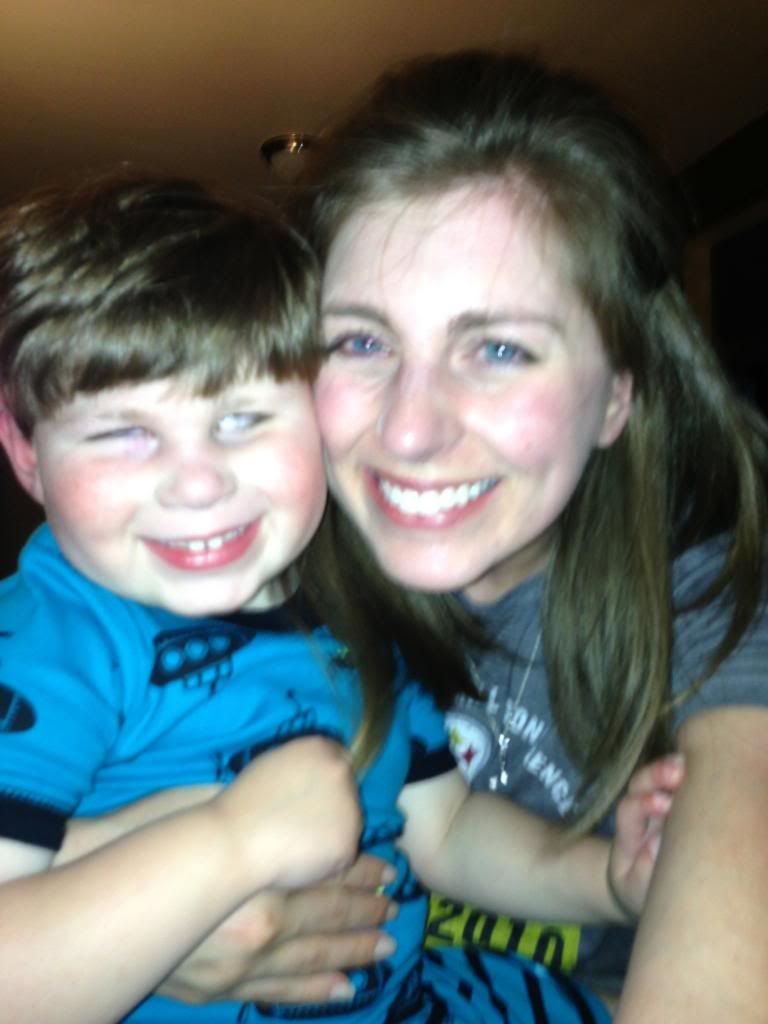A lot of people think that Braille is unnecessary now. I don't agree. As long as sighted children are learning to read letters and not just using computers, then I will demand the same for my son. Screen readers and audio books are not literacy.
But sometimes it can be hard to understand why a person who can read large print might want to read Braille. Take a look at this article- "
Minneapolis woman creates new way to learn Braille" from TwinCities.com. She shares her motivation for learning Braille as an adult and why she loves reading Braille.
 |
| Me and my little book nerd. |
Sometimes it breaks my heart when I am in a bookstore and I see the children's section. I know I will never be able to buy Tommy any books there and that is a hard pill to swallow. While I can't change what kind of books the bookstores stock, I am able to support him and advocate for his need to learn Braille.
 |
| Enjoying a "Taggies" book with Braille. |


I agree to each comment. I don't know if my daughter will be able to write clearly either. But I want her to be able to use a slate and stylus to maybe jot down a phone number or a grocery list. ( both would be cumbersome to use a computer and printer to print large enough for her to read) do you feel y still have to defend yourself even with the opthamologists? They looked at me like I was crazy when I spoke of how proud I was of her learning pre braille then switched to her being born at a perfect time with all the technology available in this day and age. Sigh.keep up the great work. This is a lonely path.
ReplyDeleteTom has no usable vision and I still have had people tell me "if he is a Braille reader." There is no if. Tom will need Braille to read and that's it!
ReplyDeleteAt least we have technology for them to enjoy the occasional audio book. I am grateful for that. However, I feel it is absurd to consider those tools a replacement for Braille literacy for a child with a severe visual impairment/blindness.
I sometimes wonder if teaching her to read print is doing her a disservice. She does have vision and uses what she has very well. ( I wonder what this is like for her since she went for so long either not wearing glasses, dirty glasses or wrong prescription. )
ReplyDeleteAnna, braille is important but so is utilizing any functional vision one may have. Being a dual reader is probably optimal. I can't say for certain because Max is totally blind. But I just found out that in regards to him speaking I should be teaching him sign language along with vocalization because they will work hand in hand as he develops his language. I imagine literacy would be the same way.
ReplyDeleteJessica, I hear ya! I have gone to the children's section sometimes with Max and his cane and the employees look at me like a nut. I can't always afford the braille books online so if I see something cheap that I can braille myself, I don't think twice about picking it up. But the stares as we look around...
At the NAPVI conference, Kathleen Martinez, spoke to the crowd about how she would not be the Assistant Secretary at ODEP if it were not for braille. Braille is incredibly important in her life and always has been. Her speech was printed in braille too, so it was interesting to see her use it as she was speaking of its importance. And, I couldn't even tell you how many people have refreshable braillers out taking notes, etc.
I agree Amber. Tom's language skills developed slowly. We taught him some signs and it really helped him to get his point across until he could say the word. Now the only sign he still uses sometimes is MORE!
ReplyDeleteTom has no vision either but if he did I would be teaching him both. Stories like this are so powerful in showing the need for both.
Someday I'm going to make it to a conference! But I just started a new job so I don't have the time off or the money right now for a conference. Maybe next year:)
Don't be sad in the children's section! Go ahead and buy the books, then take them home and adapt them yourself. Just don't puffy paint board books (a friend learned the hard way that it will come right off of the slick pages--she was peeeeved!). We spent a morning at school once adapting books with glue and all sort of materials--fur, fleece, paint, fabric. Some of them would be easy to do, I think, like Chicka-Chicka Boom Boom. You could even do (or do instead) exploration boxes to go with the books--little objects for Tommy to hold and explore while he hears the story.
ReplyDelete(I'm a bit of a crafter, so enjoy the experience and the challenge of adapting books--plus it makes me practice my braille. Peanut can recognize the sound of me pounding on the Perkins across the house!)